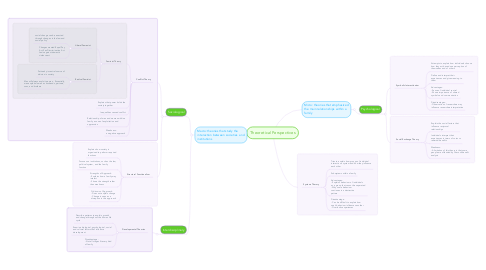
1. Macro: theories that study the interaction between societies and institutions
1.1. Sociological
1.1.1. Conflict Theory
1.1.1.1. Feminist Theory
1.1.1.1.1. Liberal Femenist
1.1.1.1.2. Radical Feminist
1.1.1.2. Explains that power holds the society together
1.1.1.3. Inequalities caused conflict
1.1.1.4. Relationship of men and women within a family as one of exploitation and oppression
1.1.1.5. Weakness: a negative approach
1.1.2. Structural Functionalism
1.1.2.1. Explains how society is organized to perform required functions
1.1.2.2. Focuses on institutions, such as the law, political system, and the family function
1.1.2.3. Strengths of Approach: - Explains how a family may interact - Shows the strength rather than weakness
1.1.2.4. Criticisms of Approach: - Does not explain change - Change is seen as a disruption in this approach
1.2. Interdisciplinary
1.2.1. Developmental Theories
1.2.1.1. Describe patterns to explain growth and change throughout the human life cycle
1.2.1.2. Examine biological, psychological, social and cultural factors that influence development
1.2.1.3. Disadvantage: - Not all stages fit every kind of family
2. Micro: theories that emphasized the main relationships within a family
2.1. Psychological
2.1.1. Symbolic Interactionism
2.1.1.1. Attempts to explain how individuals choose how they act based one perception of themselves and of others
2.1.1.2. Define and interpret their experiences and give meaning to them
2.1.1.3. Advantages: - Sense of individual control - Shows importance of shared symbols and communication
2.1.1.4. Disadvantages: - Observation of researchers may influence researchers interpretation
2.1.2. Social Exchange Theory
2.1.2.1. Explain the social factors that influence reciprocal relationships
2.1.2.2. Individuals interpret their experiences in terms of costs vs rewards/benefits
2.1.2.3. Weakness: -A limitation of this theory is that some people are offended by the cost/benefit analysis

